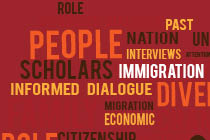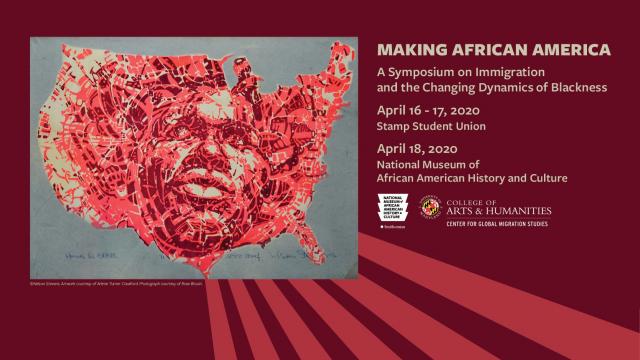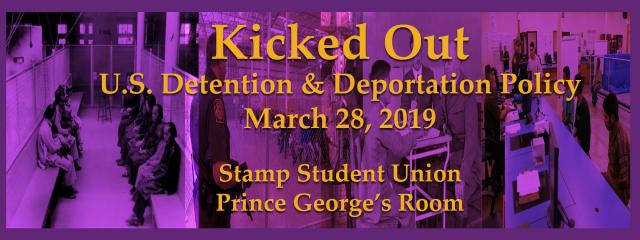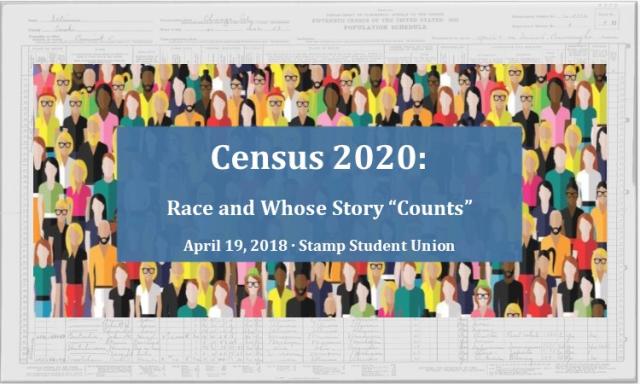Center for Global Migration Studies Conferences
Explore past and upcoming conferences and symposia organized or supported by the Center for Global Migration Studies
The center’s annual conference explores a major question in im/migration scholarship across a range of disciplines. These international conferences function as critical forums on which to disseminate new research on migration studies and through which to educate a wide public. Past conferences have considered the questions of birthright citizenship, the roles of immigrant entrepreneurs, the relationship between immigrant communities and metropolitan growth, the connections between migration and public health, and the legacy of the landmark immigration policy reform of 1965.
CGMS Spring 2025: Free and Unfree: Racialized Migrations and Inequalities
The Center for Global Migration Studies (with the Department of History; African American and Africana Studies; American Studies; Asian Studies; College of Arts and Humanities; College of Behavioral & Social Sciences; UMD Libraries; and Sociology) hosted a conference in honor of Ira Berlin (1941-2017). Organized by Julie Greene and Madeline Hsu, it was hosted by Hsu at UMD on April 30-May 1, 2025.
The theme of the conference was Free and Unfree: Racialized Migrations and Inequalities, and analayzed the intersections of chattel slavery and Asian indenture. It honored Berlin's illustrious career as a pioneering scholar of the history of slavery in the US. His impact went far beyond his scholarship, extending to leadership, vision, ethical convictions, and social justice advocacy.
A highlight of the conference was the opening keynote given by Lonnie G. Bunch III, the 14th Secretary of the Smithsonian Institution in Washington, DC. He was the founding director of the Smithsonian’s National Museum of African American History and Culture. His keynote was a conversation about "Arts and Humanities in the Making of America," facilitated by Julie Greene. The program featured three panels of scholars from across the US and Canada, carrying on the monumental work that Ira Berlin began.
CONFERENCE ABSTRACT: In a speech titled “Our Composite Nationality” delivered in 1869, Frederick Douglass upheld free migration as a right that should be secured equally for all persons regardless of race or national origin. Douglass’ prescient warning has been ignored and immigration regulation has become perhaps the most widespread enactor of legal and institutionalized inequalities, not just in the United States, but throughout the world.
This conference explores the intersections between two major vectors of inequality that are usually treated as separate fields of research: chattel slavery and immigration. Regulation of migrants, now naturalized as essential aspects of sovereignty wielded by nation-states, enacts and maintains many forms of racial inequality even as many systems of overt racial differentiation–such as enslavement, racial segregation, immigration restriction based on racial or national quotas, and anti-miscegenation restrictions–are no longer acceptable or tenable. Migration policies have become widely practiced vehicles for enacting racial projects through seemingly race-neutral criteria such as skilled or knowledge worker certification, national origin, place of birth, family relationships, selective immobilizations, and so forth, even as practices of inegalitarian regulation of mobilities are rooted in disciplinary systems developed to control workers enslaved through one of the most abusive and pernicious of racial projects.
April 30, 2025
KEYNOTE EVENT: A Conversation with Lonnie G. Bunch III: Arts and Humanities in the Making of America
4:00 p.m. - 5:30 p.m.
Ulrich Recital Hall, 1121 Tawes Hall
Welcome: Dr. Madeline Hsu, Director of the Center for Global Migration Studies
Introductory comments: Provost Jennifer King Rice and Dean Stephanie Shonekan
Interlocutor: Dr. Julie Greene, University of Maryland Department of History
May 1, 2025
Panel Presentations (schedule below)
9:00 a.m.- 5:00 p.m.
Juan Ramon Jimenez Room, Stamp Student Union
Panel Presentation Schedule:
9:00 a.m.
Opening Remarks: Dr. Madeline Hsu, Director of the Center for Global Migration Studies
9:15 a.m. - 11:00 a.m.
Panel 1: Slavery and Immobilization
Chair and Comment: Edlie Wong (UMD)
Kevin Kenny (New York University):Who controlled migration in the United States before the Civil War?
Diego Javier Luis (Johns Hopkins University): The Transpacific Influences of a Proposal to Deport "Indios of the Philippine Islands" from Colonial Mexico
Michael Schoeppner (University of Maine): Free Black Crimmigration in Antebellum America
11:00 a.m. - 1:00 p.m.
Lunch
1:00 p.m. - 2:45 p.m.
Panel 2: Restricting the “Unfree”: African Enslavement and Asian Indenture
Chair and Comment: Madeline Hsu (UMD)
Radhika Mongia (York University): Slavery, Indenture, and the Making of Modern Migration Regimes
Nicole Burrowes (Rutgers University):The Afterlives of Enslavement and Indenture in Guyana
Guy Emerson Mount (Wake Forest University): “He Shall Be Free”:Carcerality, State Formation, and Freedom Suits in the Black Pacific”
3:00 p.m. - 4:30 p.m.
Panel 3: African American Heterogeneity: Immigrants and Legacies of Enslavement
Chair: Niambi Carter (UMD)
Comment: Candis Watts Smith (Duke University)
Chinyere Osuji (UMD): "African before Race: Reframing the Origins of Anti-Blackness"
Reuel Rogers (Northwestern University): Willing to Run, But Can They Represent? How African American Voters Assess Black Immigrant Candidates
Amon Emeka (Skidmore College): Identity and Intermarriage in the African Second Generation
4:30 p.m.
Closing Remarks
CGMS Fall 2022: Migration and Climate
This event is free and open to the public. Light refreshments will be served.
This event was generously co-sponsored by the Center for Global Sustainability (School of Public Policy); the Department of American Studies; the Department of Anthropology; the Department of Sociology; the Maryland Population Research Center; and the US Latina/o Studies Program.
Location: Prince George's Room, Stamp Student Union
12:30 pm Panel Conversation
- Alice Bullard is a Washington, D.C.-based lawyer with a practice in human rights, trafficking, personal status, and mediation. She serves clients in the US and abroad. She has worked in human rights in West Africa since the late 1990s. From 1994-2006, Bullard was a professor of history at the Georgia Institute of Technology, where she co-founded the Human Rights Initiative. Her publications include Exile to Paradise; Human Rights in Crisis; and Mauritania Look: The Struggle for Human Rights, as well as numerous essays. She earned her doctor in history from the University of California, Berkeley and her juris doctorate from the Georgetown University Law Center.
- Sarah Cameron is Associate Professor in the Department of History at the University of Maryland, College Park. Her research interests include genocide and crimes against humanity, environmental history, and the societies and cultures of Central Asia. Her first book, The Hungry Steppe: Famine, Violence, and the Making of Soviet Kazakhstan, examined a little-known crime of the Stalinist regime, the Kazakh famine of 1930-33. The book won four book awards (the Reginald Zelnik Book Prize, the W. Bruce Lincoln Book Prize, the Joseph Rothschild Prize in Nationalism and Ethnic Studies, and the Southern Conference on Slavic Studies Book Prize). She is at work on a new book, "The Aral Sea: Environment, Society, and State Power in Central Asia" that project will offer the first complete account of one of the worst environmental catastrophes of the 20th century, the disappearance of the Aral Sea. In 2022, she was named an Andrew Carnegie Fellow to support her research on the Aral Sea.
- Deb Niemeier is a Clark Distinguished Chair in the School of Engineering at the University of Maryland, where is is also the director of the Center for Disaster Resilience, a research hub with a focus on better understanding and addressing the risks posed by natural hazards, including extreme weather. A National Academy of Engineering member, she joined the UMD civil and environmental engineering faculty in 2019. Her work has helped spur policy and regulatory changes through groundbreaking research in the areas of vehicle emissions, air quality, affordable housing, and infrastructure funding. More recently, she has focused on the aspects of the built environment that give rise to structural inequality, particularly within the context of climate change.
- Lauren Herzer Risi is the Program Director of the Environmental Change and Security Program at the Wilson Center. She works with policymakers, practitioners, donors, and researchers to generate innovative, transdisciplinary solutions to development and security challenges related to environmental change and natural resource management. She has authored and edited a number of reports including: 21st Century Diplomacy: Foreign Policy is Climate Policy; Navigating Complexity: Climate, Migration, and Conflict in a Changing World; After the Disaster: Rebuilding Communities; Backdraft: The Conflict Potential of Climate Change Adaptation and Migration; and Our Shared Future: Environmental Pathways to Peace. She is also the managing editor of New Security Beat and the co-producer of a series of podcasts exploring the unintended consequences of climate change. She holds a master's degree in environmental security and peace from the UN-mandated University for Peace in Costa Rica.
3:00 pm Keynote Address by journalist Todd Miller
Todd Miller has researched and written about border issues for more than 15 years. His work has appeared in the New York Times, TomDispatch, The Nation, San Francisco Chronicle, In These Times, Guernica, and Al Jazeera English, among other places. He is the author of four books: Building Bridges, Not Walls: A Journey to a World Without Borders; Empire of Borders: The Expansion of the U.S. Border around the World; Storming the Wall: Climate Change, Migration, and Homeland Security; and Border Patrol Nation: Dispatches from the Front Lines of Homeland Security.
CGMS 2021 Conference: Immigration and the Making of African America
Immigration and the Making of African America will explore the largely untold history of African diasporic immigrants to the United States and their relations with native-born African Americans over the last 150 years. Black immigrants developed distinctive strategies for assimilating, even while maintaining ties with their countries of origin. They have profoundly influenced the social, political, and cultural history of the United States. In exploring these themes and by connecting immigration and African American history and culture, this conference will bring together scholars across the humanities to rethink the standard narratives of both fields, demonstrate that the fields must be in dialogue with one another, and illuminate in new ways the complexity of blackness in historical and contemporary America. Research presented at the conference will serve as the basis for the publication of an edited work of scholarship examining black immigration. The conference will combine academic panels at the University of Maryland with community-focused events at the National Museum of African American History and Culture.
Learn more about Immigration and the Making of African America.
CGMS June 2019: Global Labor Migration: Past and Present
Labor migration is a vast, global, and highly fluid phenomenon in the 21st century, capturing public attention and driving political controversy. There are more labor migrants working in areas beyond their birth country or region than ever before. Although scattered across the social ladder, migrant workers have always clustered, at least initially, in the bottom rungs of the working class. Even as cross-border or inter-regional movement may beckon as a source of hope and new opportunity, the experience for the migrants and their families is often fraught with peril. Labor migrants are vulnerable: they are exploited more easily by recruiters and employers, and are less likely to benefit from union representation. They often face arrest or deportation when attempting to fight for their rights, and are bound to special documents that limit their ability to change jobs. Moreover, as recent history reminds us, host-country fears directed towards labor migrants can also spark larger political movements characterized by nativist, racist, or even outright fascist tendencies. Clearly, there is a need to combat fear with understanding and to reach for improved global regulations and standards to protect the rights and welfare of migrants alongside those of host country working people.
Because today global labor migration is shaping the lives of millions, and because it is receiving unprecedented attention by scholars, the newly-formed Global Labor Migration Network (GLMN) is currently planning for a Global Labor Migration Summit to take place in Amsterdam in summer 2019. Involving scholars and activists from diverse parts of the globe and drawing on a wide variety of disciplines--including history, sociology, anthropology, ethnic studies, women and gender studies, public health, law and public policy--this project will bring international attention to one of the world’s most pressing issues, generate scholarly dialogue and new research agendas, and propose policies that can improve conditions for migrants. The conference will also include a range of presentation formats: brief papers, roundtables, and open conversations.
CGMS March 2019: Kicked Out: U.S. Detention & Deportation Policy
On March 28, 2019, the Center for Global Migration Studies will host Kicked Out, an interdisciplinary conference examining the history and contemporary impact of United States detention and deportation policies. Brining together leading scholars, public officials, students, activists, and community members, the conference is a venue to discuss the use of detention and deportation, the impact on communities, and strategies for responding.
The conference will feature a panel discussion on the national/transnational context of Detention. Kelly Lytle Hernandez, Professor of History and African American Studies at the University of California, Los Angeles, will deliver a keynote address discussing migrant communities and the carceral state.
CGMS 2018: Census 2020: Race and Whose Story "Counts"
On April 19, 2018, the Center for Global Migration Studies hosted Census 2020, an interdisciplinary conference exploring the role of racial categorization in the upcoming census. These categories will determine which Americans will be counted. While the term “census” evokes images of government “bean counters” and data specialists, this conference draws attention to the critical ways in which the Census can be viewed as a critical and on-going racial formation project. The Census has long determined how the state apportions political power as well as the distribution of good and resources across the population, from language-assistance to health services to school construction. In the past, the Census has undercounted communities of color, low-income persons, and rural persons. Conference participants discussed how racial categories are created, how they reflect the politics of contemporary and historical America, and how they shape the experiences of citizenship, identity formation, and belonging.
View the Census 2020: Race and Whose Story "Counts" archive.
CGMS 2017: Global Labor Migration Network Inaugural Workshop
On April 20-21, 2017, the Center for Global Migration Studies hosted the inaugural workshop of the Global Labor Migration Network. The Center's mission is to study migration through interdisciplinary collaborations and through a global framework. It is also committed to a model of engaged scholarship and pedagogy that seeks to illuminate contemporary social problems. The conditions surrounding global labor migration today--unprecedented in world history--provide the challenge and opportunity for precisely this model.
The workshop featured two days of panels. The first day concluded with a public talk given by Ruth Milkman (CUNY Graduate Center) titled “Precarity and Polarization: Global Migrants in the 21st Century U.S. Labor Market.” The lunchtime talk on April 21 featured Brian Finnegan, AFL-CIO Global Worker Rights Coordinator, on the policy implications of global labor migration research. We concluded with time to meet as a group to discuss next steps and to brainstorm for the major conference planned for 2019.
View the Global Labor Migration Network Inaugural Workshop archive.
CGMS October 2016: Crimmigration in the Shadow of Sovereignty
The Crimmigration in the Shadow of Sovereignty CINETS Conference on October 6-7, 2016 at the University of Maryland, College Park featured the themes: federalism and sovereignties, technologies and control, borders, enforcement and detention, and trafficking and forced migration. This conferences was co-sponsored by MLAW Programs, a state-of-the-art collaboration between the University of Maryland, College Park and the Francis King Carey School of Law in Baltimore. For several years, scholarship on crimmigration has been flourishing, attracting scholars from various disciplines to focus on the intersection of crime control and immigration control. The concept has proven to be very useful in making sense of the systemic criminalization of migration in many western liberal democracies. The theme of the conference, In the Shadow of Sovereignty, reflected our desire to continue to extend crimmigration scholarship along lines of securitization, national identity, and federalism. The conference endeavored to facilitate international and comparative dialogue and scholarship integrating critical social and legal theory with empirical research.
View the Crimmigration in the Shadow of Sovereignty CINETS Conference archive.
CGMS April 2016: Organizing for Power and Workers' Rights in the Twenty-First Century
On April 14, 2016, the Center for the History of the New America at the University of Maryland will host a symposium exploring workers and organizing in the twenty-first century. Attacks on the freedom to organize in the last several decades have created new challenges for working people. New creative approaches have consequently emerged in sectors across the economy such as in domestic care, fast food, big box merchandising, etc. This symposium seeks to examine all those areas while also placing them within the context of a rapidly globalizing environment. Some questions that interest us include: what are the most effective strategies for organizing and supporting working people today and in the future? How might we support a strong and mutually beneficial relationship between the workers’ centers that have emerged around the nation and the organized labor movement? Given the importance of immigrant workers to the 21st century political economy, how might we more fully integrate an understanding of global capital flows and outsourcing into our assessment of the challenges of labor organizing?
Vie the Organizing for Power and Workers' Rights in the Twenty-First Century archive.
CGMS 2015: Remaking America: The Immigration and Nationality Act of 1965 and Its Impact
On November 12, 2015, the Center for the History of the New America at the University of Maryland will host a one-day conference marking the fiftieth anniversary of the Immigration and National Act of 1965 (also known as the Hart-Celler Act). The conference will explore the policy implications of the revised immigration framework created by the Act and the impact of the Act on communities in the United States and abroad.
The Hart-Celler Act abolished the national origins quota system that had structured American immigration policy since the 1920s, replacing it with a system that opened the doors for the migration of African, Asian, Caribbean, and Latin American peoples. At present some 40 million (nearly 13 percent of the American people) are immigrants. Today’s immigrants arrive from around the world and are incredibly diverse in terms of racial, cultural, and religious identity. This conference will consider the legacy of the Act and the ways that new immigrant populations have profoundly influenced American culture and society.
CGMS September 2014: Health Across Borders: Migration, Disease, Medicine, and Public Health in a Global Age
On September 18-19, 2014, the Center for the History of the New America and the Center for Health Equity at the University of Maryland will co-host a conference exploring the connections between migration, race, disease, and public health. Dr. David Satcher, 16th Surgeon General of the United States, will give the keynote address in the Atrium in the Stamp Student Union.
Historically, immigration has had as much to do with the movement of disease as with the movement of people. In the United States, Ellis, Angel, and Sullivan Islands began as quarantine stations, and to this day immigrants and their health continue to be a focus of policy debates. From smallpox to AIDS, immigrants have been the targets of medicalized prejudice and have been stigmatized by associations with disease. After their arrival, immigrants face unique challenges when interacting with doctors, hospitals, and governmental health care professionals. Although their work leaves them vulnerable to injury and disease, immigrants struggle with inequities in access to quality health care.
Health Across Borders: Migration, Disease, Medicine, and Public Health in a Global Age will bring together leading scholars, practitioners, public officials, labor leaders, and immigrants themselves to explore public health in the age of mass migration. Among other matters, they will address the economics of migration, patterns of prejudice in medical practices, and access to health insurance. The conference will be free and open to the public, with no registration required.
CGMS March 2014: The Migrant Metropolis
Participants in this conference will examine how urban spaces in the modern United States have been built and re-built by the movement of people. The conference will focus on the impact of migration and immigration on the networks of cities, suburbs, and hinterlands long central to organizing American life. The metropolis is fashioned not just by powerful interests, clear-cut "push" and "pull" factors, and resultant population changes. Equally formative are the varieties of aspirational politics, commercial activity, and cultural production that accompany migration and community building.
Presentations and discussions will revisit traditional questions about assimilation, the role of racial or ethnic identity, and the formal (legal) politics of belonging by introducing a range of new vantage points, including: regional, borderland, and transnational community-building; the spatial politics of metropolitan inclusion and exclusion; the political economy of policing and incarceration; and global circuits of intellectual and cultural production. Scholars will examine how metropolitan spaces have historically served as catalysts for changing ideas about citizenship, for acceptable uses of state power, and for ongoing processes of racial formation. The Migrant Metropolis will foster conversations about the ways that urbanized sites are not simply places but also processes, integral to shaping political, economic, and cultural life in the modern United States.
CGMS September 2012: Immigration and Entrepreneurship: An Interdisciplinary Conference
This conference was free and open to the public. A report of the conference written by staff from the German Historical Institute can be found here (pdf).
Conveners: Professors David B. Sicilia and David F. Barbe, University of Maryland, College Park; Professor Hartmut Berghoff, German Historical Institute and University of Göttingen
The United States has long been an immigrant society as well as an entrepreneurial society. This is no coincidence: immigrants launch new enterprises and invent new technologies at rates much higher than native-born Americans. As the volume of in-migration again approaches that of the "new immigration" at the turn of the twentieth century, it is time to measure how immigrants have shaped the American economy in the past and how immigration policy reform in 1965 has fostered the transformation of business and economic life in the United States. How have newcomers shaped and in turn been shaped by American economic life?


















